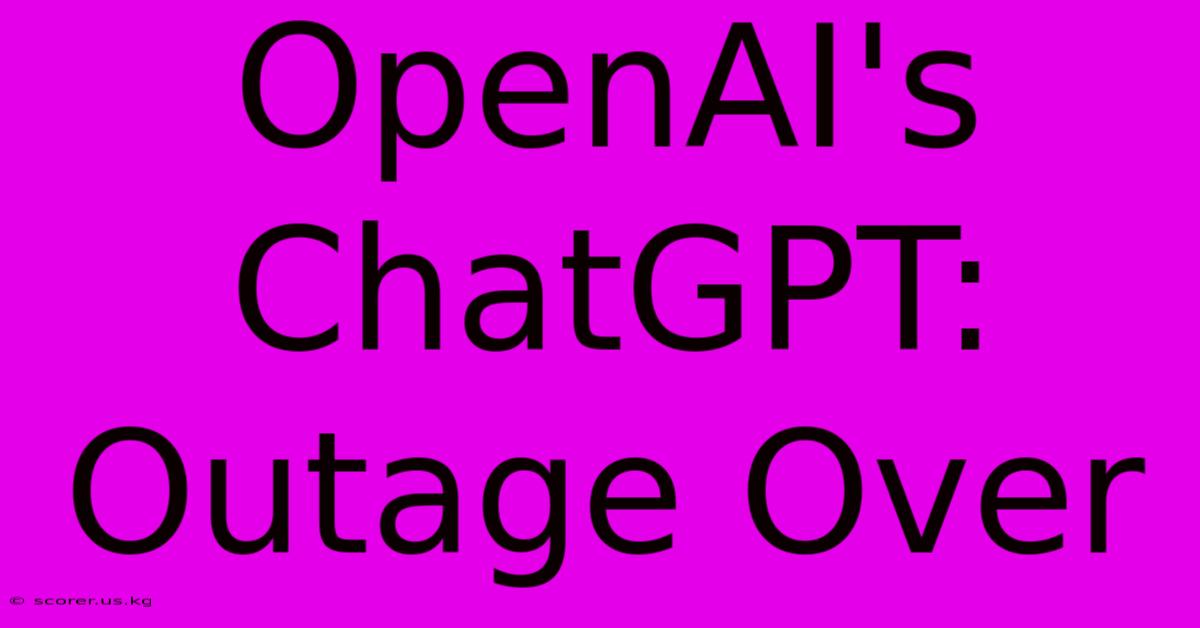OpenAI's ChatGPT: Outage Over

Discover more detailed and exciting information on our website. Click the link below to start your adventure: Visit Best Website scorer.us.kg. Don't miss out!
Table of Contents
OpenAI's ChatGPT: Outage Over - Back Online and Better Than Ever?
The recent ChatGPT outage left many users frustrated and scrambling for alternatives. But the wait is over! ChatGPT is back online, and OpenAI has likely learned valuable lessons from the downtime. This article delves into the outage, its potential causes, and what it means for the future of this powerful AI chatbot.
What Happened During the ChatGPT Outage?
The recent outage, while frustrating, wasn't entirely unexpected. Large language models like ChatGPT are incredibly complex systems, relying on vast computational resources and intricate infrastructure. A variety of factors could contribute to such disruptions, including:
- High User Demand: ChatGPT's explosive popularity has led to unprecedented demand, potentially overwhelming the servers. This is a classic case of scaling challenges for a rapidly growing service.
- Server Issues: Hardware failures, network problems, or even software bugs within the OpenAI infrastructure could have caused the outage. Maintaining such a large-scale system is a constant juggling act.
- Maintenance and Updates: OpenAI might have been performing scheduled maintenance or deploying updates to improve the system's performance, stability, or security. This is a common reason for planned or unplanned outages.
- Cybersecurity Threats: Although less likely, a cybersecurity incident – such as a distributed denial-of-service (DDoS) attack – could have temporarily disrupted service.
Impact of the Outage
The outage highlighted ChatGPT's importance to users across various fields. From students using it for research to professionals leveraging its capabilities for tasks like writing and coding, the temporary unavailability underscored its significant role in productivity and workflow. The disruption served as a stark reminder of our increasing reliance on these powerful AI tools.
What OpenAI Might Have Learned (and Implemented)
OpenAI, undoubtedly, learned valuable lessons from this outage. Their likely responses include:
- Improved Infrastructure: Increased server capacity and redundancy are key to preventing future outages. Investing in more robust and scalable infrastructure is crucial.
- Enhanced Monitoring: More sophisticated monitoring systems can detect potential issues before they escalate into widespread outages. Real-time monitoring and predictive analytics are essential for proactive problem-solving.
- Better Disaster Recovery: A well-defined disaster recovery plan is paramount. This plan should include procedures for quickly restoring service and minimizing downtime in the event of future disruptions.
- Improved Communication: Clear and timely communication with users during outages is essential. OpenAI might have improved its communication strategy to keep users informed of the situation and provide estimated restoration times.
What the Future Holds for ChatGPT
Despite the temporary setback, ChatGPT's future looks bright. The outage has likely prompted OpenAI to further strengthen its infrastructure and refine its operational processes. We can expect:
- Greater Reliability: Improved infrastructure and enhanced monitoring should lead to significantly improved reliability and reduced downtime.
- Enhanced Performance: Ongoing development and updates will likely bring performance improvements, including faster response times and increased efficiency.
- Increased Capacity: OpenAI will likely continue to invest in expanding its capacity to handle the growing demand for ChatGPT.
The recent outage, while frustrating for users, serves as a valuable learning experience for OpenAI. It underscores the importance of robust infrastructure, proactive monitoring, and effective communication in maintaining a reliable and high-performing service. The improved ChatGPT that emerges from this experience will likely be even more resilient and efficient, strengthening its position as a leading AI chatbot.

Thank you for visiting our website wich cover about OpenAI's ChatGPT: Outage Over. We hope the information provided has been useful to you. Feel free to contact us if you have any questions or need further assistance. See you next time and dont miss to bookmark.
Featured Posts
-
Where Will Teddy Bridgewater Play
Dec 27, 2024
-
2024 Rate Bowl Kansas State Vs Rutgers Odds
Dec 27, 2024
-
Jimmy Butler Heat Deny Trade Talks
Dec 27, 2024
-
Johnson Edwards Lead K State Comeback Win
Dec 27, 2024
-
Man City Draw Everton Match Analysis
Dec 27, 2024
